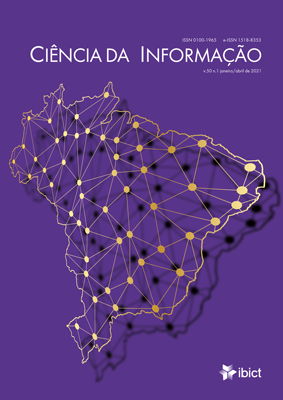La Teoría Epidémica en la Bibliometría Brasilera
DOI:
https://doi.org/10.18225/ci.inf.v50i1.5049Keywords:
Bibliometria. Cientometria. Brasil. Teoria epidêmica. Modelo SIR.Abstract
Aplica o modelo da teoria epidêmica à literatura sobre métricas (bibliometria, cientometria, infometria, webmetria, arquivometria, tecnometria, patentometria, etc.) produzidas e publicadas no Brasil e por brasileiros no exterior. Foram identificados 6180 documentos produzidos por 9715 autores diferentes, de 1973 a 2018. A proporção de autores em relação às publicações para toda a população de quarenta e seis anos foi de 1,6. As pesquisas sobre a bibliometria brasileira entraram em estado epidêmico na década de 2000. O modelo epidêmico indica que os infectados continuarão a crescer sem atingir ainda seu ponto de saturação logística.
Downloads
References
BENNION, B.C.; NEUTON, L.A. The epidemiology of research on Anomalous water. Journal of the American Society for Information Science, v.27, n.1, p.53-56, 1976.
BERNOULLI, D. Esai d’ une nouvelle analyse de la mortalité causée par la petite vérole, et des advantages de l’inoculation pour la prévenir. Mémoires de Mathématique et de physique, n.1-45, 1760.
BETTENCOURT, L.M.A.; CINTRÓN-ARIAS, A.; KAISER, D.I.; CASTILLO-CHÁVEZ, C. The power of a good idea: quantitative modeling of the spread of ideas from epidemiological models. Physica A, n.364, p.513-536, 2006.
BLOWER, S. An attempt at a new analysis of the mortality caused by smallpox and of the advantages of inoculation to prevent it. Reviews in Medical Virology, v.14, n.5, pp.275-288, 2004.
BRAUN, T. The epidemic spread of fullerene research. Angewandte Chemie, International Edition in English, v.31, n.5, p. 588-589, 1992.
BRAUN, T.; LYON, W. S. The epidemiology of research on florinjection analysis: an unconventional approach, Fresenius Z. Anal Chemistry, n.319, p.74-77, 1984.
BUJDOSÓ, E.; LYON, W. S.; Noszlopi, I. Prompt nuclear analysis: growth and trends: a scientometric study. Journal of radioanalytical chemistry, v.74, n.1, p.197-238, 1982.
CALDEIRA, P.D.T. Processo de crescimento epidemológico aplicado à literatura brasileira de doença de chagas. Ciência da Informação, v.4, n.1, p.5-16, 1975.
GALINDO URIBARRI, S.; RODRÍGUEZ MEZA, M.A.; CERVANTES COTA, J.L. Las matemáticas de las epidemias: caso México 2009 y otros. Ciencia ergo-sum, Revista Científica Multidisciplinaria de Prospectiva¸v.20, n.3, p.238-246, 2013.
GARFIELD, E. The epidemiology of knowledge and the spread of scientific information. Current Contents, n.35, p.5-10,1980.
GILBERT, G.N.; WOOLGAR, S. The quantitative study of science: an examination of the literatura. Science Studies, v.4, n.3, p.279-294, 1974.
GOFFMAN, W. An epidemic process in an open population. Nature, v.205, n.4973, p.831-832, 1965.
GOFFMAN, W. Stability of epidemic process. Nature, v.210, n.5038, p.786-787, 1966a.
GOFFMAN, W. A Mathematical Model for Describing the Compatibility of Infectious Diseases. Journal of Theoretical Biology, v.11, p.349-361, 1966b.
GOFFMAN, W. Mathematical approach to the spread of scientific ideas: the history of mast cell research. Nature, v.212, n.5061, p.449-452, 1966c.
GOFFMAN, W. An application of epidemic theory to the growth of science (symbolic logic from Boole to Gödel). International Congress of Cybernetics (1st: 1969: London). Progress of cybernetics: proceedings of the first international congress of cybernetics. 1969.
GOFFMAN, W. A Mathematical method for Analyzing the Growth of a Scientific Discipline. Journal of the Association for Computing Machinery, v.18, n.2, p.173-185, 1971.
GOFFMAN, W.; HARMON, G. Mathematical approach tothe prediction of scientific discovery. Nature, v.229, n.5980, p.103-104, 1971
GOFFMAN, W.; NEWILL, V.A. Generalization of epidemic theory: an application to the transmission of ideas. Nature, v.204, n.4955, p.225-228, 1964.
GOFFMAN, W.; NEWILL, V.A. Communication and epidemic processes. Proceedings of the Royal Society A, 298, p. 316-334, 1967.
GOFFMAN, W.; WARREN, K.S. Application of the Ker-mack-Mckendrick theory to the epidemiology of Schistosomiasis. The American Journal of Tropical Medicine and Hygiene, v.19, n.2, p.278-283, 1970.
HAWKINS, D.T. The Literature of noble gas compounds. Journal of Chemical Information and Computer Sciences, v.18, n.4, p.190-199, 1978
KERMACK, W.O.; MCKENDRICK, A. G. Contributions to the mathematical theory of epidemics, Part I. Proceedings of the Royal Society of Edinburgh. Section A. Mathematics. n.115, p.700–721, 1927.
OLIVEIRA, S.M.D. Estudo do comportamento da literatura brasileira de teologia adventista: análise de crescimento epidêmico. Ciência da informação, v.13, n1, p.25-52, 1984.
RAPOPORT, A. Spread of information through a population with sociostructural bias: I. Assumption of transitivity. Bulletin of Mathematical Biophysics, v.15, p.523-533, 1953.
RESTREPO-ARANGO, C. La difusión epidémica de la literatura sobre estudios métricos en Colombia. Revista Conhecimento em Ação, v.2, n.2, p.45-55, 2017.
URBIZAGÁSTEGUI ALVARADO, R.; SUÁREZ, J. La teoría epidémica en la literatura sobre la Ley de Lotka. Investigación Bibliotecológica, v.22, n.46, p.91-111, 2008.
WAGNER-DÖBLER, R. William Goffman’s mathematical approach to the prediction of scientific discoveries, revised. In Proceedings of the 7th Conference of the International Society for Scientometrics and Informetrics, July 5-8, 1999, Colima, México, pp. 522-531.
WARREN, K.S.; GOFFMAN, W. The ecology of the medical literatures. The American Journal of the Medical Sciences, v.263, n.4, p.267-273, 1972.
Downloads
Published
Issue
Section
License
Copyright (c) 2020 Ruben Alvarado Urbizagastegui

This work is licensed under a Creative Commons Attribution-ShareAlike 4.0 International License.
- This publication reserves the right to modify the original, regarding norms, spelling and grammar, in order to maintain the standards of the language, still respecting author writing style;
- The final proofs will not be sent to the authors;
- Published works become Ciência da Informação's property, their second partial or full print being subject to expressed authorization by IBICT's Director;
- The original source of publicaton must be provided at all times;
- The authors are solely responsible fo the views expressed within the article;
- Each author will receive two hard copies of the issue, if made availalbe in print.




























